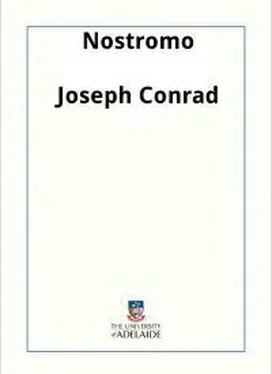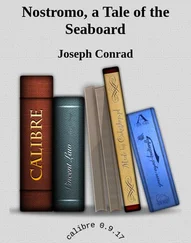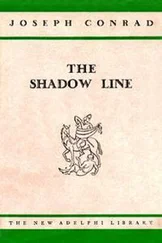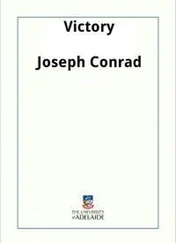Джозеф Конрад - Nostromo - A Tale of the Seaboard
Здесь есть возможность читать онлайн «Джозеф Конрад - Nostromo - A Tale of the Seaboard» весь текст электронной книги совершенно бесплатно (целиком полную версию без сокращений). В некоторых случаях можно слушать аудио, скачать через торрент в формате fb2 и присутствует краткое содержание. Год выпуска: 2006, Жанр: Классическая проза, на английском языке. Описание произведения, (предисловие) а так же отзывы посетителей доступны на портале библиотеки ЛибКат.
- Название:Nostromo: A Tale of the Seaboard
- Автор:
- Жанр:
- Год:2006
- ISBN:нет данных
- Рейтинг книги:4 / 5. Голосов: 1
-
Избранное:Добавить в избранное
- Отзывы:
-
Ваша оценка:
- 80
- 1
- 2
- 3
- 4
- 5
Nostromo: A Tale of the Seaboard: краткое содержание, описание и аннотация
Предлагаем к чтению аннотацию, описание, краткое содержание или предисловие (зависит от того, что написал сам автор книги «Nostromo: A Tale of the Seaboard»). Если вы не нашли необходимую информацию о книге — напишите в комментариях, мы постараемся отыскать её.
Nostromo: A Tale of the Seaboard — читать онлайн бесплатно полную книгу (весь текст) целиком
Ниже представлен текст книги, разбитый по страницам. Система сохранения места последней прочитанной страницы, позволяет с удобством читать онлайн бесплатно книгу «Nostromo: A Tale of the Seaboard», без необходимости каждый раз заново искать на чём Вы остановились. Поставьте закладку, и сможете в любой момент перейти на страницу, на которой закончили чтение.
Интервал:
Закладка:
“Misericordia! We are getting terribly bruised in this crowd!” she exclaimed, smiling up courageously to him. “We have started on foot. All our servants ran away yesterday to join the democrats. We are going to put ourselves under the protection of Father Corbelan, of your sainted uncle, Antonia. He has wrought a miracle in the heart of a most merciless robber. A miracle!”
She raised her voice gradually up to a scream as she was borne along by the pressure of people getting out of the way of some carts coming up out of the ford at a gallop, with loud yells and cracking of whips. Great masses of sparks mingled with black smoke flew over the road; the bamboos of the walls detonated in the fire with the sound of an irregular fusillade. And then the bright blaze sank suddenly, leaving only a red dusk crowded with aimless dark shadows drifting in contrary directions; the noise of voices seemed to die away with the flame; and the tumult of heads, arms, quarrelling, and imprecations passed on fleeing into the darkness.
“I must leave you now,” repeated Charles Gould to Antonia. She turned her head slowly and uncovered her face. The emissary and compadre of Hernandez spurred his horse close up.
“Has not the master of the mine any message to send to Hernandez, the master of the Campo?”
The truth of the comparison struck Charles Gould heavily. In his determined purpose he held the mine, and the indomitable bandit held the Campo by the same precarious tenure. They were equals before the lawlessness of the land. It was impossible to disentangle one’s activity from its debasing contacts. A close-meshed net of crime and corruption lay upon the whole country. An immense and weary discouragement sealed his lips for a time.
“You are a just man,” urged the emissary of Hernandez. “Look at those people who made my compadre a general and have turned us all into soldiers. Look at those oligarchs fleeing for life, with only the clothes on their backs. My compadre does not think of that, but our followers may be wondering greatly, and I would speak for them to you. Listen, senor! For many months now the Campo has been our own. We need ask no man for anything; but soldiers must have their pay to live honestly when the wars are over. It is believed that your soul is so just that a prayer from you would cure the sickness of every beast, like the orison of the upright judge. Let me have some words from your lips that would act like a charm upon the doubts of our partida, where all are men.”
“Do you hear what he says?” Charles Gould said in English to Antonia.
“Forgive us our misery!” she exclaimed, hurriedly. “It is your character that is the inexhaustible treasure which may save us all yet; your character, Carlos, not your wealth. I entreat you to give this man your word that you will accept any arrangement my uncle may make with their chief. One word. He will want no more.”
On the site of the roadside hut there remained nothing but an enormous heap of embers, throwing afar a darkening red glow, in which Antonia’s face appeared deeply flushed with excitement. Charles Gould, with only a short hesitation, pronounced the required pledge. He was like a man who had ventured on a precipitous path with no room to turn, where the only chance of safety is to press forward. At that moment he understood it thoroughly as he looked down at Don Jose stretched out, hardly breathing, by the side of the erect Antonia, vanquished in a lifelong struggle with the powers of moral darkness, whose stagnant depths breed monstrous crimes and monstrous illusions. In a few words the emissary from Hernandez expressed his complete satisfaction. Stoically Antonia lowered her veil, resisting the longing to inquire about Decoud’s escape. But Ignacio leered morosely over his shoulder.
“Take a good look at the mules, mi amo,” he grumbled. “You shall never see them again!”
CHAPTER FOUR
Charles Gould turned towards the town. Before him the jagged peaks of the Sierra came out all black in the clear dawn. Here and there a muffled lepero whisked round the corner of a grass-grown street before the ringing hoofs of his horse. Dogs barked behind the walls of the gardens; and with the colourless light the chill of the snows seemed to fall from the mountains upon the disjointed pavements and the shuttered houses with broken cornices and the plaster peeling in patches between the flat pilasters of the fronts. The daybreak struggled with the gloom under the arcades on the Plaza, with no signs of country people disposing their goods for the day’s market, piles of fruit, bundles of vegetables ornamented with flowers, on low benches under enormous mat umbrellas; with no cheery early morning bustle of villagers, women, children, and loaded donkeys. Only a few scattered knots of revolutionists stood in the vast space, all looking one way from under their slouched hats for some sign of news from Rincon. The largest of those groups turned about like one man as Charles Gould passed, and shouted, “Viva la libertad!” after him in a menacing tone.
Charles Gould rode on, and turned into the archway of his house. In the patio littered with straw, a practicante, one of Dr. Monygham’s native assistants, sat on the ground with his back against the rim of the fountain, fingering a guitar discreetly, while two girls of the lower class, standing up before him, shuffled their feet a little and waved their arms, humming a popular dance tune.
Most of the wounded during the two days of rioting had been taken away already by their friends and relations, but several figures could be seen sitting up balancing their bandaged heads in time to the music. Charles Gould dismounted. A sleepy mozo coming out of the bakery door took hold of the horse’s bridle; the practicante endeavoured to conceal his guitar hastily; the girls, unabashed, stepped back smiling; and Charles Gould, on his way to the staircase, glanced into a dark corner of the patio at another group, a mortally wounded Cargador with a woman kneeling by his side; she mumbled prayers rapidly, trying at the same time to force a piece of orange between the stiffening lips of the dying man.
The cruel futility of things stood unveiled in the levity and sufferings of that incorrigible people; the cruel futility of lives and of deaths thrown away in the vain endeavour to attain an enduring solution of the problem. Unlike Decoud, Charles Gould could not play lightly a part in a tragic farce. It was tragic enough for him in all conscience, but he could see no farcical element. He suffered too much under a conviction of irremediable folly. He was too severely practical and too idealistic to look upon its terrible humours with amusement, as Martin Decoud, the imaginative materialist, was able to do in the dry light of his scepticism. To him, as to all of us, the compromises with his conscience appeared uglier than ever in the light of failure. His taciturnity, assumed with a purpose, had prevented him from tampering openly with his thoughts; but the Gould Concession had insidiously corrupted his judgment. He might have known, he said to himself, leaning over the balustrade of the corredor, that Ribierism could never come to anything. The mine had corrupted his judgment by making him sick of bribing and intriguing merely to have his work left alone from day to day. Like his father, he did not like to be robbed. It exasperated him. He had persuaded himself that, apart from higher considerations, the backing up of Don Jose’s hopes of reform was good business. He had gone forth into the senseless fray as his poor uncle, whose sword hung on the wall of his study, had gone forth—in the defence of the commonest decencies of organized society. Only his weapon was the wealth of the mine, more far-reaching and subtle than an honest blade of steel fitted into a simple brass guard.
Читать дальшеИнтервал:
Закладка:
Похожие книги на «Nostromo: A Tale of the Seaboard»
Представляем Вашему вниманию похожие книги на «Nostromo: A Tale of the Seaboard» списком для выбора. Мы отобрали схожую по названию и смыслу литературу в надежде предоставить читателям больше вариантов отыскать новые, интересные, ещё непрочитанные произведения.
Обсуждение, отзывы о книге «Nostromo: A Tale of the Seaboard» и просто собственные мнения читателей. Оставьте ваши комментарии, напишите, что Вы думаете о произведении, его смысле или главных героях. Укажите что конкретно понравилось, а что нет, и почему Вы так считаете.












